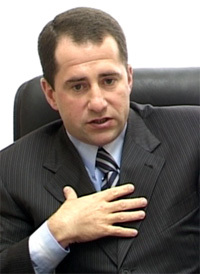This entry perhaps requires something of a full (or as full as is necessary) disclosure, if for no other reason than to add some local provenance to a past practitioner career that very much rubbed up against organised crime, initially indirectly and latterly directly.
Within the family tree on the Slavic side there are, perhaps paradoxically given the author’s past career, several (in)famous Slavic organised criminals. Indeed the godfather of the boy is, or was, a Godfather. For the sake of this entry he will be called “Uncle V”.
“Uncle V” grew up in a life of criminality in Russia. It would be perhaps incorrect to post current family – or “Family” – photographs, however above is a youthful photograph of “Uncle V – Number 9” with those who would go on to become members of (in)famous Russian organised crime groups of the late 1980’s/early 1990s – Dolgoprudny, Chechenskaya, Solntsevo, Lyubertsy and Hadi Taktash.
“Uncle V’s” career in criminality went from stealing jams and sweats as a boy, through stealing (lots of) coal as a juvenile, to making the criminal “big time” during the “wild, wild east” of the early 1990s when he became a big fish within Solntsevo/Solnetsevo Grouperovka – making many $ millions and significant political connections along the way.
He still owns a huge apartment (with sauna) near Red Square on Old Arbat, despite spending much time in recent years living in luxury in a rather plush home in Beverley Hills.
When the blog decided to move from Moscow to Odessa more than a decade ago, “Uncle V” decided it would be wise to have somebody watch over his family members while adjusting to life in Odessa. Upon arrival “Artur”, who apparently “ate the same bread” with “Uncle V” (a euphemism for serving time together and forging a “solemn bond”) insured that not only were all “acclimatising” troubles little ones – but that there were no troubles whatsoever. “Artur” was and remains a long term resident of Odessa – although not a native.
“Artur”, it has to be said, is a particularly venomous specimen of the “homo odessamafiosi” category. Over the many years of knowing him he has moved (physically if not mentally) from the less than salubrious Modovanka district in Odessa to the well-heeled Arkadia, “acquiring” car dealerships, car washes and various other business interests along the way – notwithstanding rather luxurious weddings and the production of children during that time too.
It follows that between “Artur” and several other locals like him, together with good relations among the Armenians of a similar career path within Odessa, plus many years as a practitioner upon the side of the angels attempting to curtail such criminality both indirectly and directly, this blog has retained despite leaving that practitioner career behind, an academic interest in organised criminality, particularly that of Odessa – be it resident, connected, or passing through.
As such there are numerous entries mentioning the top tier of organised criminality, past and present, within the years of achieves of the blog. Messrs (Angel) Angert, Zhukov, Trukhanov, (Lamposhka) Galanternik, Milin et al., have all featured historically.
Those of a nefarious past but no longer resident (for long periods) here, such as “Uncle V”, and Messrs Angert and Zhukov both of whom are now predominantly London based, have spent a lot of effort in becoming (mostly) legit.
Those such as Messrs Trukhanov and Galanternik that remained in Odessa, whilst far from legitimising all their criminal dabbling have progressed in legitimising where they can, still unable to entirely walk away. Beyond the pervasive nepotism of “favours” within this elite group, they are no longer interested in the majority of criminal opportunities – the schemes and scams have to be very big indeed to tempt them. That said, it would be nothing short of an absolute waste not to employ the influence of Mr Trukhanov whilst Mayor of Odessa.
Provenance is now (hopefully) established to the degree necessary to now comment upon current local organised criminal events that have recently caught the eye.
There are, of course, tiers of organised criminality below the $ multi-millions/billions generated by the elite criminality mentioned in the preceding paragraphs over the years. There are the secondary tiers in which “Artur” operates – and those yet further below.
Within the lesser tiers it appears that matters are getting somewhat fractious of late.
Disputes smoldering over the past 4 or 5 years are now beginning to bubble between several fractious organised groups. New entrants are also arriving. It is perhaps wise to paint with broad brushstrokes a picture of the current situation, lest matters boil over with few on-lookers understanding why.
Firstly, it is necessary to set aside the organised criminality of the Chinese and Vietnamese. This group very much operates within its own ethnic parameters – with the exception of large scale black market money exchange. Just as China rarely recruits a spy from outside its own ethnic group, likewise in Odessa, rarely do the Asian organised criminal groups work outside its own ethnic group.
(As an aside the Asian currency traders at 7KM Market give far better black market exchange rates than the illicit Slavic changers located at places like the Kniga market.)
There is also the rather insular Chechenski (Chechen) group, which like the Chinese and Vietnamese, tend not to tread on too many toes unless their toes are stood upon, also operating within certain parameters – much of which the group has managed to legitimise over time. That said, loosely aligned with the Chechens are the drug dealers of Privoz market, “One eye” and “Lala” Luzya, and also two individuals dealing in smuggling and illicit freight, “Isa” and “Khaled”.
Aside from a few car-parking schemes within Odessa itself, the Gagauz Group very much stick to their turf within MP Anton Kisse’s fiefdom of “Bessarabia” in the southwest of the Oblast, predominantly dealing in stolen agricultural machinery and agri chemicals – including cross-border smuggling with Transnistria and Moldova.
There are also a number of independent operators, several Azerbaijanis, and Turks with very small groups, as well as small but well established individuals, for example in the Surovo district of Odessa, Mamuka Narindashvili, whose protection comes from within the criminal investigation community of the police. Mr Narindashvili appears to have attracted the cooperation, or perhaps even mastery over, the youthful Eldar (aka Dagestan) wannabes, for now active only a long way north of Odessa City.
Now for the friction that appears to leading rapidly toward unpredictable outcomes.
16 years ago, when this century began, organised and disorganised “street crime”, for want of a better label, broadly occurred under the direction of, with the tacit approval of, or by paying “tribute” to, a Thief-in-law named Malkhaz. His reign, lasting about a decade, saw the beginning of the end of the more disciplined criminal groups within Odessa of the 1990s “Uncle V” era.
Splintering occurred and groups became far more “fluid” in formation – albeit “declared membership” required between 10% – 20% of illicit funds to be “donated” to the group “common fund” as tradition dictated – and still does.
(Many of those that have left or who flirted temporarily within these groups during this particularly “fluid” period have become genuinely legitimate business people – some very successful and quite legitimately. The problem being that the “kompromat” from those “eventful days” remains and despite the decades passed, is never quite forgotten. As such, if and when influence is required within the visible world, the underworld comes knocking at the doors of its lost sons to get it.
Likewise, those that have sought justice – or injustice – outside of the corrupt justice system via local criminal groups are also thereafter never entirely free either.)
After nearly a decade in charge, Mr Malkhaz was replaced by Anthimos Kuhilava as undisputed head honcho of “street crime”. Under his stewardship, Mr Kuhilava saw two rival groups vie for predominance – that of Omar Bekaev (aka Uncle, or Uma, or Omar Ufa), and Mindy Goradze (aka Hromy (Limpy in English)).
Now to the cause of the current tempest.
In 2012, Anthimos Kuhilava was arrested and deported persona non grata (PNG), leaving the top spot on the ground open. Both rival organisations of Messrs Bakaev and Goradze could count upon about an even number within their respective groups (100 or so). But before either managed to win any secession battle, in 2013 Mr Bakeav was arrested in Odessa, jailed for weapon possession, to then be mysteriously released and deported to Russia where he currently remains in prison for offences committed within the Russian Federation. This however, did not remove his leadership of his group – nor lessen its loyalty to him.
Mr Goradze meanwhile, just over a year later was also arrested whilst in Moldova and returned to an awaiting Georgia.
Nature abhors a void, ergo a physically present leadership was required. Mr Bakeav delegated group members “Bela”, “Ogaezov” and “Anzor” to run the ship – two of which are now currently on remand. Mr Goradze delegated group members “Shusharik” and “Finsky” – yet due to fairly even criminal weight none have managed to secure the vacant crown and fill the void. Both pretenders to the empty throne therefore unable to actually sit on it, nor appoint a temporary custodian in their absence.
It is this continuing absence of an acknowledged top dog, together with now long standing simmering rivalry which is to be noted – and perhaps has been by those of similar criminal creed.
It is surely no coincidence that over the past 2 months in Odessa, arrests and expulsions of three “Thieves-in-law” have occurred.
Between mid June and a few days ago, .Messrs David (Swan) Gerliani, Teimuraz (Tsrutsi) Chkhetiam and Vladmimir (Poltova) Dribnym have all being arrested and banned from Ukraine.
More will follow.
These are naturally headline grabbing events in the local media – and one look at Police Chief Giorgi Lortkipnidze’s curriculum vitae would tell a reader two things – he is adept at catching and dealing with “Thieves-in-law” and also with recruiting and running informants among those prone to terrorist activity. (A particularly good combination when considering organised criminality and terrorism often overlap when it comes to revenue/funding streams.)
It is also apparent that Salifov Nadir Nariman Oglu (Guli), albeit currently in prison in Azerbaijan, has his group arriving and making waves within Odessa too.
Indeed it is rumoured that a dozen or so leading organised criminals and or “Thieves-in-law” have passed through Odessa recently.
It has all become rather congested between the existing, albeit fractious groups none of which have managed to successfully take control, and the appearance of both new groups, together with old-school individuals and their aging networks that still know opportunity when they see it.
This notwithstanding the influx and semi (or perhaps) permanent arrival of those internally displaced (IDPs) from the occupied Donbas and illegally annexed Crimea that are now resident in Odessa and the criminal elements therein. Only recently 3 illicit MDMA factories set up by IDPs from Donetsk have already been closed by the police in Odessa.
Although this lower tier of organised criminality is perhaps not as directly effected as that above it by the the backdrop of disrupted organised criminality channels that existed between Crimea and Odessa prior to annexation, or some notable personnel changes of influence within Moldova, or any forthcoming repercussions from current events in Turkey that may also directly or indirectly alter existing top level criminal agreements, it nevertheless adds to the perception that it has all become somewhat more unstable – and unpredictable.
If the new entrants to the Odessa criminal market place become strong enough, or if the visiting old guard are wise enough and deft enough, either may become significant problems for both Mr Bakeav and Mr Goradze who remain equally close, and yet equally distant, from assuming the still vacant position within the organised crime of Odessa left by Anthimos Kuhilava back in 2012.
Pondering these recent and not so recent events, the question is how long before this underworld issue gets settled – at what cost and to whom? Also worth considering is who may benefit from continued discord or power brokerage – after all, the spook community be they domestic or foreign, are not unknown to employ such proxies to further their ends when the opportunity present itself.








